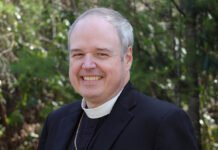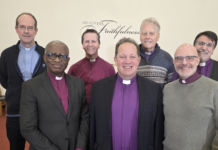The bishops of the diocese have written to clergy and Readers about the Terminally Ill (End of Life) Bill, now before Parliament, unequivocally expressing their concerns about the Bill and setting out an alternative:
“No one wants to see others experiencing great pain, but the choice is not between unbearable suffering or assisted suicide.”
The bishops advocate “Instead of ending life because it has become intolerable, we would urge greater investment in palliative care to make the end of life not only tolerable but to allow for all a “good death”. Effective and well-funded palliative care offers a way of allowing those we love to die peacefully when the time comes.”
If passed, the Bill would “allow adults who are terminally ill, subject to safeguards and protections, to request and be provided with assistance to end their own life”. The provision will be restricted to mentally competent adults assessed as having six months or less to live.
The bishops ask the ministers of the diocese:
- To help their congregations to ponder the issues it raises in teaching and preaching
- To be assured of their prayers and support as ministers wrestle with these issues.
- If they share their viewpoint, to consider writing to their own MP, with the assurance of prayers and setting out their concerns.
The bishops argue: “The complex debate surrounding assisted suicide brings questions about suffering and death, individual rights and the good of wider society, and what it means to live a dignified human life. For many of us, it will touch on painful personal experiences of seeing those we love suffer at the end of life. For those of us in pastoral ministry, we will find ourselves in challenging conversations on these matters with grieving relatives and those who are dying.”
Acknowledging that advocates for assisted suicide are motivated by compassion and a desire to see suffering alleviated, and the differing views amongst Christians, the bishops recall that The General Synod of the Church of England has twice debated assisted suicide in recent years (2012 and 2022) and, by a large majority, opposed any change to the current law.
Starting with the affirmation that all human life is a gift of God – ‘the Lord gives, and the Lord takes away’ the bishops state: “Every human life is sacred and precious, and this cannot be diminished by adverse circumstance or the will of others. This is intrinsic to who we are, and our dignity as human beings, made in the image of God, cannot be taken from us, even by the most terrible suffering.”
“Our fear is that a society in which some lives are deemed “not worth living” becomes a perilous place for the most vulnerable amongst us”, they reason.
They continue: “In a secular culture, theological arguments will not convince everyone, but we make common cause with the widely shared concern that a change to the current law will put the vulnerable at great risk. In this, we stand with groups representing older people or those with disabilities. In some cases, the sick and elderly will feel as though they have become a “burden” to family or society and that they should therefore seek an assisted suicide. Sadly, some will be subject to direct coercion or subtle pressure. The danger is we move from those who are terminally ill understanding that they can take their own life to believing they ought to do so.”
Ad Clerum – Assisted Suicide
To all licenced clergy and ministers
The topic of this ad clerum is contentious. Any clergy/ministers approached by the media should contact the Director of Communications, Arun Kataria (07930 826182 / arun.kataria@lichfield.anglican.org) before responding. Individual viewpoints will be respected as the expression of personal opinions.
Assisted Suicide
We write because you will be aware that the Terminally Ill (End of Life) Bill is now before Parliament. If passed, the Bill would “allow adults who are terminally ill, subject to safeguards and protections, to request and be provided with assistance to end their own life”. The provision will be restricted to mentally competent adults with six months or less to live.
The debate surrounding assisted suicide is complex and highly charged. Here, we are faced with questions about suffering and death, about individual rights and the good of wider society and what it means to live a dignified human life.
This is not merely an academic discussion. For many of us, it will touch on painful personal experiences of seeing those we love suffer at the end of life. For those of us in pastoral ministry, we will find ourselves in challenging conversations on these matters with grieving relatives and those who are dying.
It is clear to us that those who advocate for assisted suicide are motivated by compassion and a desire to see suffering alleviated. The General Synod of the Church of England has twice debated assisted suicide in recent years (2012 and 2022) and, by a large majority, opposed any change to the current law but we recognise that there are differing views amongst Christians.
As bishops in this Diocese, we wish to offer our prayers and support for you as you wrestle with these issues and help those in your care to do the same. We also want to express our concerns about the Bill.
We begin with an affirmation that all human life is a gift of God – “the Lord gives, and the Lord takes away”. Every human life is sacred and precious, and this cannot be diminished by adverse circumstance or the will of others. This is intrinsic to who we are, and our dignity as human beings, made in the image of God, cannot be taken from us, even by the most terrible suffering.
Our fear is that a society in which some lives are deemed “not worth living” becomes a perilous place for the most vulnerable amongst us.
We know that in a secular culture, theological arguments will not convince everyone, but we make common cause with those who are concerned that a change to the current law will put the vulnerable at great risk. This is a concern shared widely, not least by groups representing older people or those with disabilities. In some cases, the sick and elderly will feel as though they have become a “burden” to family or society and that they should therefore seek an assisted suicide. Sadly, some will be subject to direct coercion or subtle pressure. The danger is we move from those who are terminally ill understanding that they can take their own life to believing they ought to do so.
Instead of ending life because it has become intolerable, we would urge greater investment in palliative care to make the end of life not only tolerable but to allow for all a “good death”. No one wants to see others experiencing great pain, but the choice is not between unbearable suffering or assisted suicide. Effective and well-funded palliative care offers a way of allowing those we love to die peacefully when the time comes.
We would urge you to find opportunity in your teaching and preaching to help those in your congregations to ponder these issues. If, like us, you are troubled by this Bill, you may also wish to write to your MP assuring them of your prayers and setting out your concerns.
We will hold you in our prayers as you seek to minister to those in your care and share with them – and a fearful world – the good news of the Risen Lord Jesus,
+Matthew
+Paul
+Sarah
+Tim
(Bishop Michael is on sabbatical)



